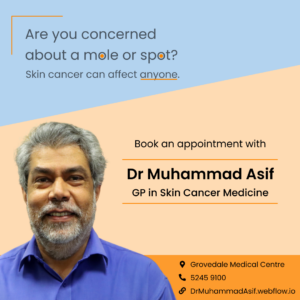We have GPs with a special interest in skin cancer checks, and additional training in the detection and removal of skin cancers.
Australia has one of the highest rates of skin cancer in the world. About two in three Australians will be diagnosed with some form of skin cancer before the age of 70.
What is skin cancer?
There are three main types of skin cancer:
- Basal Cell Carcinoma,
- Squamous Cell Carcinoma and
- Melanoma.
Basal Cell Carcinoma and Squamous Cell Carcinoma are the most common types of skin cancer and are sometimes call non-melanoma skin cancer. Melanoma usually begins as a new small spot, mole or freckle that changes colour, shape or thickness over months.
Skin cancer occurs when skin cells are damaged, for example, by overexposure to ultraviolet (UV) radiation from the sun.
Skin cancer checks
A skin cancer check assesses your skin cancer risk and indicates any current skin problems of concern.
The skin cancer check includes taking your medical history, including previous sun UV exposure, as well as undertaking a detailed examination of your skin. If any moles or lesions have developed or changed in size or nature recently, our doctors will assess and recommend the necessary treatment.
We recommend you see your GP for a skin cancer check at least annually. As well as scheduling your annual assessment, you should see your GP should you notice any of the following signs:
- Changes in a mole size, shape or colour
- The edges of a mole have begun to change
- The mole starts and continues to grow
- The mole is not a solid brown colour, but multicoloured instead
If you notice any of the above, it is advised to book an appointment immediately with your GP for an examination. Your doctor will provide you with a thorough skin check, and scan for symptoms of larger issues.
Skin cancer treatment
There is no single method to treat all skin cancers and precancerous lesions. Choice of method is dictated by the size of the lesion, its location, its type (often confirmed by biopsy), and whether it is a primary or recurrent lesion.
Also considered is the patient’s age, health, occupation and preference for treatment method.
Preventing skin cancer
According to the Cancer Council, for best protection, they recommend a combination of sun protection measures:
- Slip on some sun-protective clothing that covers as much skin as possible.
- Slop on broad spectrum, water resistant SPF30 (or higher) sunscreen. Put it on 20 minutes before you go outdoors and every two hours afterwards. Most important, sunscreen should never be used to extend the time you spend in the sun.
- Slap on a hat – broad brim or legionnaire style to protect your face, head, neck and ears.
- Seek shade.
- Slide on some sunglasses – make sure they meet Australian Standards.
About Dr Muhammad Asif

Dr Muhammad Asif Skin Doctor
Dr Muhammad Asif (MBBS, DA, FRACGP) is a general practitioner with over 30 years of experience, and he holds a Professional Certificate in Skin Cancer Medicine. He uses digital dermatoscopy (specifically, a cloud-based intelligent dermatology software called DermEngine) and digital photography of skin lesions to aid in diagnosing skin cancers. Dr Asif does skin full-body checks as well as spot/lesion checks, and also performs skin surgery including flap reconstruction of defects in the head and face. Additionally, Dr Asif offers serial curettage and cautery for lesions and topical therapies for some non-melanoma skin cancers.
Find our more information about Dr Muhammad Asif.
In summary, to book a skin cancer check with Dr Asif, please contact us.


